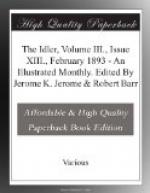* * * * *
[Sidenote: Burgin thinks it all depends on the people who love.]
One morning the average man gets up, lights his pipe, roams round his rooms in all the ease of unshaven countenance and dressing-gown-clad form. Then he goes out, and meets her. There may be a hundred women in the room, or park, or tennis ground, wherever the tragedy (Love is a tragedy) commences. When the lights are low he comes back, and is low also. Wonders how men can be such brutes as to want dinner; thinks his life has been misspent; that he is unworthy to touch her hand; that he has wallowed in the fleshpots, and here is a way out of them. And if the man’s nature be noble and sweet and true; if he has hitherto drifted adown the stream of circumstance because his fellows have also drifted; then, with the deepening tides of his passion, the old spirit of knight-errantry descends upon him with its mystic mantle of white samite. And slowly out of this deepening torrent of bewildered impulse and devotion is born a new man—a man with a soul—a man who can dare all things, do all things, endure all things, for the sake of the woman he loves. At the baptism of her touch he becomes whole, and shapes his life to noble ends. Even if he can’t marry her, he is the better for his passion. Such a love endures until the leaves of the Judgment Book unroll; for it laughs to scorn the pitiful fools who boast of infidelity, the “male hogs in armour,” as Kingsley calls them, who look upon women as toys, the sport of an idle moment, rather than the spiritual force which leavens the world, and makes it an endurable and joyous dwelling-place.
[Sidenote: And on the woman loved.]




